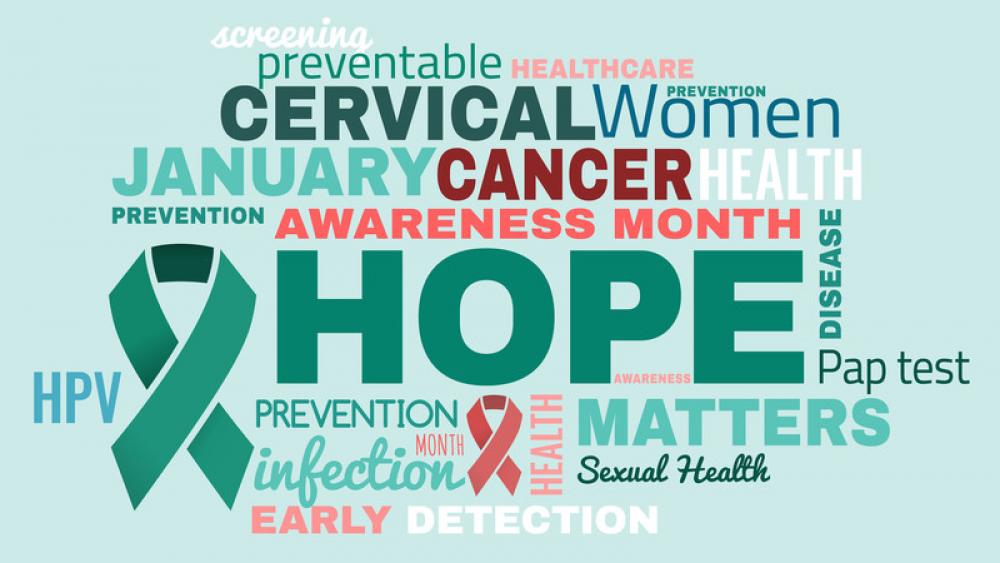




Women's Health
Cervical Cancer Prevention and Treatment Saves Lives
Published: Jan. 16, 2023

Early detection and prevention have turned what was once one of the nation’s leading cancer killers into one of the most treatable. Here's what you need to know about cervical cancer.
What Causes Cervical Cancer?
The main cause of cervical cancer is the human papillomavirus (HPV). HPV is an extremely common sexually-transmitted virus. I see it nearly every day in my clinic.
In fact, there are nearly 30 to 40 different types of HPV causing 14 million new genital HPV infections every year. HPV is so common that nearly all sexually active individuals get it at some point in their lives. The virus does not always lead to cervical cancer, however. Some subtypes of the virus are the high-risk types that cause cervical cancer; low-risk types do not cause cancer but may cause genital warts.
Most HPV infections occur without any symptoms and go away on their own within a year or two without causing cancer. Some HPV infections, however, can persist for many years. It’s these high-risk HPV types – mostly HPV types 16 and 18 – that can lead to cell changes on the cervix that, if untreated, may progress to cancer. It’s behind nearly 70 percent of all cervical cancer cases.
What Can You Do To Lower Your Cervical Cancer Risk?
Have Regular Screenings
It’s suggested that female-bodied people see a gynecologist by age 15 or so. If the person has a gynecologic issue, of course, they may be seen at a younger age. If someone has no gynecologic complaints and their personal and family histories are straightforward, the person most likely does not need a pelvic exam.
HPV infection is almost always sexually transmitted. Thus, almost all cervical cancers are from HPV infection. It shocks some patients with newly diagnosed HPV that their infection could have been transmitted from any sexual partner, even from years ago. If someone is not sexually active and never has been, the likelihood of cervical cancer is incredibly low. However, most medical organizations, including the American College of Obstetricians and Gynecologists (ACOG) and the U.S. Preventive Services Task Force (USPSTF), suggest obtaining a pelvic exam and Pap smear – the screening test for cervical cancer – in all individuals with a cervix starting at age 21.
It's important to realize that some individuals have risks that necessitate more frequent cervical cancer screening. This may include having HIV, being immunocompromised or having had previous abnormal Pap smears. But for the average risk patient, cervical cancer screening guidelines are as follows:
Less than 21 years old: no screening
Ages 21-29: Pap smear alone every three years
Ages 30-65: Any one of the following:
- Pap smear alone every three years
- FDA-approved high-risk HPV testing alone every 5 years
- Pap smear and high-risk HPV testing every 5 years
Age 65 and older: No screening if adequate, negative testing has been done in the last 10 years
Hysterectomy: No screening if there is no cervix and no history of high-grade cervical pre-cancer or cervical cancer
Get the HPV Vaccine
HPV vaccines are a strong weapon in preventing cervical cancer. They also protect against other conditions caused by HPV like oral, penile and anal cancers. These safe, effective vaccines protect people against about 75 percent of high-risk the HPV types and the health problems the virus can cause.
We recommend the HPV vaccine to all our patients ages 9-26 and some patients ages 27-45. We favor primary prevention, meaning vaccination before exposure.
The Centers for Disease Control and Prevention (CDC) recommends that children receive the HPV vaccine series anywhere from ages 9 to 26. Most commonly, it’s given in the middle school age group. The vaccine is also approved for people ages 27 to 45.
Pediatricians are doing a great job of getting their patients vaccinated when they are in the middle school age group.
Use a Condom
If you are sexually active, wearing a latex condom may lower the risk of HPV and HPV-related diseases, such as genital warts and cervical cancer. However, HPV can infect areas that are not covered by a condom – so they may not fully protect against HPV.
Take the Next Step
For more information about HPV and cervical cancer or to schedule a screening, talk today with your Methodist Physicians Clinic health care provider.
More Resources
- Learn more about women's health services at Methodist.
- Get answers to common questions about the HPV vaccine.
- Looking for a provider? Need to schedule an appointment? Visit our appointments page to get started.


